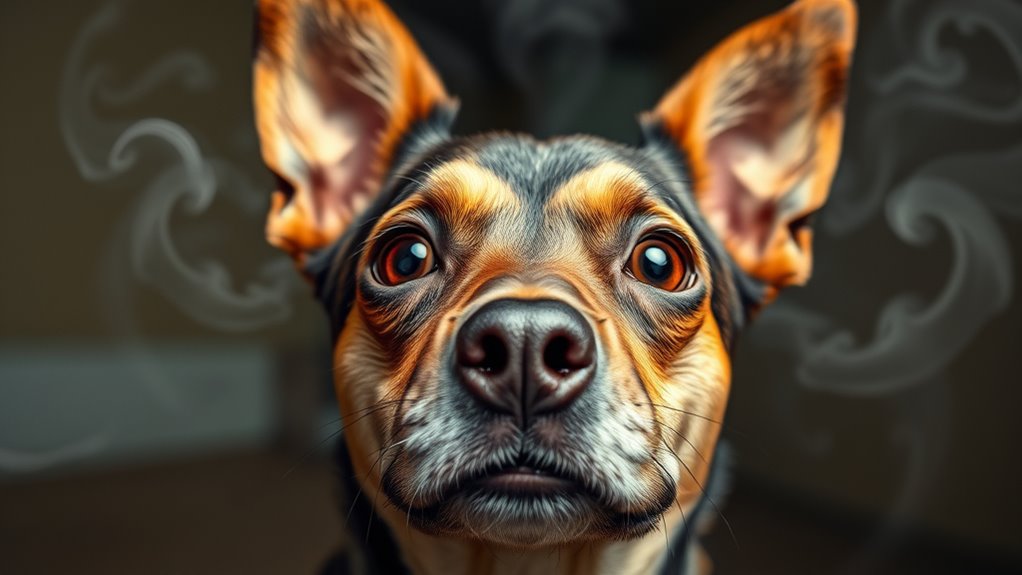If your pet has inhaled smoke, watch for signs like coughing, wheezing, and difficulty breathing. Excessive drooling, rapid or shallow breaths, and unusual lethargy also indicate trouble. You might notice your pet becoming anxious or disoriented. Recognizing these symptoms early can save their life. Staying alert and understanding what to look for can make a big difference in emergencies—continue exploring to learn how to protect your furry friend effectively.
Key Takeaways
- Coughing, wheezing, and difficulty breathing are primary signs of smoke inhalation in pets.
- Excessive drooling and rapid or shallow breaths indicate respiratory distress from smoke exposure.
- Pets may appear anxious, lethargic, or disoriented after inhaling smoke.
- Early symptoms can include coughing fits and noisy breathing, requiring prompt veterinary attention.
- Monitoring for sudden changes in breathing helps identify inhalation issues quickly.

Smoke inhalation poses a serious threat to pets, especially during fires or when exposed to secondhand smoke. As a responsible pet owner, your first priority should be ensuring their safety through proper fire safety measures. Having a fire escape plan that includes your pets is essential. Keep pet rescue tools, like carriers and leashes, easily accessible so you can quickly evacuate if a fire breaks out. Remember, every second counts in these situations, and a well-practiced plan can make all the difference in saving your furry friend’s life. During a fire, smoke quickly fills the environment, making it difficult for your pet to breathe. Recognizing the symptoms of smoke inhalation early can help you act swiftly and get them the medical attention they need. Look for signs such as coughing, wheezing, difficulty breathing, or excessive drooling. Pets may also become anxious, exhibit rapid or shallow breathing, or show lethargy. If you notice any of these symptoms during or after a fire, it’s essential to seek veterinary care immediately. Prompt treatment can greatly improve your pet’s chances of recovery.
Additionally, understanding the specific vulnerabilities of different breeds can help you better protect your pet from smoke-related dangers.
Secondhand smoke from cigarettes or other sources can also cause serious health issues for your pets over time. Chronic exposure might lead to respiratory problems, allergic reactions, or even more severe conditions like asthma or lung disease. So, the best way to protect them is to avoid smoking indoors and ensure good ventilation. If you suspect your pet has been exposed to smoke, monitor them closely for any unusual breathing patterns or symptoms. Regular veterinary checkups are necessary, especially if you live in an area prone to wildfires or if you’re a smoker. Educate yourself on how to recognize the early signs of smoke-related distress in your pets, so you can act quickly.
In a fire emergency, your calmness and quick response are key. Never delay pet rescue efforts, and always prioritize your safety. Use your knowledge of fire safety protocols to guide your actions, making sure you can evacuate both yourself and your pets swiftly. Remember, being prepared and aware of the symptoms of smoke inhalation can save your pet’s life. Regularly review safety plans, keep emergency supplies handy, and stay vigilant to protect your furry companions from the dangers of smoke inhalation. Your proactive approach not only helps prevent emergencies but also ensures that, when they do happen, you’re ready to respond effectively.
Frequently Asked Questions
Can Certain Dog Breeds Be More Susceptible to Smoke Inhalation?
Yes, certain dog breeds are more susceptible to smoke inhalation due to breed susceptibility and genetic predispositions. Breeds with shorter noses, like Bulldogs and Pugs, tend to have more difficulty breathing in smoky environments, making them more vulnerable. You should be especially cautious if your dog belongs to a breed with known respiratory issues, as their genetics can exacerbate the effects of smoke exposure, increasing their risk of inhalation-related health problems.
How Can I Prevent My Pets From Inhaling Smoke During a Fire?
Imagine your pets’ safety as a lighthouse guiding you through danger. To prevent smoke inhalation during a fire, create and regularly practice fire escape plans that include your pets. Keep them in a well-ventilated, smoke-free area or take them outside if it’s safe. Prioritizing their respiratory health helps protect them from harmful toxins, ensuring you’re prepared to act swiftly and keep them safe in emergencies.
Are There Long-Term Health Risks for Pets Exposed to Smoke?
Yes, pets exposed to smoke face long-term health risks, especially concerning pet respiratory issues. You might notice persistent coughing, wheezing, or difficulty breathing even after the initial exposure. Continuous inhalation of smoke toxins can lead to chronic respiratory problems and other health complications. To protect your pet’s long-term health, guarantee immediate veterinary care after smoke exposure and monitor for any signs of ongoing respiratory distress.
What Immediate Steps Should I Take if My Pet Shows Symptoms?
If your pet shows symptoms of smoke inhalation, act quickly. Remove your pet from the smoky area, verify their safety, and contact your veterinarian immediately. Keep your pet calm, offer water if they’re able to drink, and avoid giving any medication unless directed. Prioritize emergency response by monitoring their breathing and symptoms until professional help arrives. Your swift action can make all the difference in safeguarding your pet’s health.
Is Secondhand Smoke From Cigarettes Dangerous to Pets?
Secondhand smoke from cigarettes is definitely dangerous to pets. It worsens indoor air quality and can cause serious issues with their respiratory health. As a pet owner, you should avoid smoking indoors to protect your furry friends. Keeping your home smoke-free helps improve indoor air quality and reduces health risks for your pets. Prioritize their respiratory health by creating a clean, smoke-free environment.
Conclusion
Remember, an ounce of prevention is worth a pound of cure. Keep your home smoke-free and make sure your pets have a safe space away from fires or smoke. Recognize the symptoms early—like coughing, difficulty breathing, or lethargy—and seek veterinary help immediately. Your vigilance can make all the difference in protecting your furry friends from harm. Stay alert, stay safe, and always prioritize your pet’s health—because a healthy pet is a happy pet.










